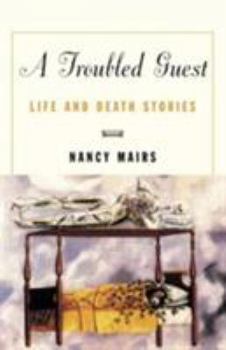A Troubled Guest: Life and Death Stories
Select Format
Select Condition 
Book Overview
A focused personal and ethical examination of life in the face of death, by one of our most acclaimed essayists. This description may be from another edition of this product.
Format:Paperback
Language:English
ISBN:0807062499
ISBN13:9780807062494
Release Date:October 2002
Publisher:Beacon Press
Length:195 Pages
Weight:3.25 lbs.
Dimensions:0.6" x 5.5" x 8.2"
Customer Reviews
2 ratings
Death and Revelations
Published by Thriftbooks.com User , 15 years ago
As we get older, most of us think more and more about death. As Nancy Mairs puts it, "People who reach a point in their lives analogous to mine find themselves confronted by death more and more frequently until, one day, they come smack up against their own." As a thirty-year-old I might not have stayed with this book. At sixty-six I read every page greedily, drinking in chapter after chapter. Nancy Mairs has plenty to say about the death of her father when she was eight, of her mother decades later, and of her son--a death that "appalls in a way no other death can do, because it violates the natural order." Many of us know Mairs as a fearless writer, especially when dealing with herself and her family. She slips into a tale as if into a river, swims around with some powerful strokes and climbs out open-eyed, offering some difficult truths. Her paragraphs, clear and piercing, seem to have spilled easily onto the page. She makes it look easy, as if she has seen, understood and written, all in an instant. Among the many strong chapters in the book, I found the one on suicide galvanic. After describing her own suicide attempt, one Halloween years ago, the author explains that it was made "when my children were too old for trick-or-treating and more than old enough to pick up the unspoken message that their mother was willing to die and leave them." It was depression that led to that attempt--and if antidepressants can keep such depression at bay, she says, "hand me the bottle." Mairs lives with multiple sclerosis, and has watched her own life diminish. "Over the years I have lost the ability to work, to drive, to walk, to put on or take off my clothes, to turn over in bed, even to pee. With each new indignity, I think I've come to end of my endurance, and then I get through another day." Though she sometimes wishes for her own death, no reader could. Not when she's writing books like this, filled with supple prose and passages that come off like revelations. Take this one, on suffering: "To refuse to suffer is to refuse fully to live. Doing so leads not only to risky behaviors (self-mutilation, anorexia nerviosa, and addiction all stem from an inauthentic relation to suffering) but also to an anesthesia of the soul which renders play all but impossible." I want to quote and quote from this book.
The best book by Nancy Mairs yet!
Published by Thriftbooks.com User , 22 years ago
This book of essays about death is carefully, thoughtfully and sensitively written. As always with Mairs' books, the author shares her personal life, but there are no histironics, no self-pity in this book. Rather she gives us a clear-eyed, deeply felt look at the deaths of key people in her life. I suspect many readers, like me, will identify some of the deaths with ones of loved ones in their own lives, and while this may bring tears, there is a spiritual depth to be found here that is comforting and informative. I believe I have read all of the books written by this author, and I find this one the best written and most satisfying.





